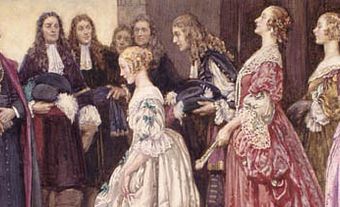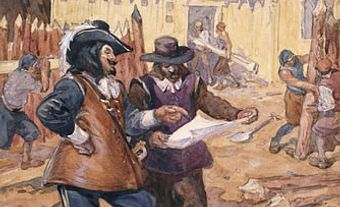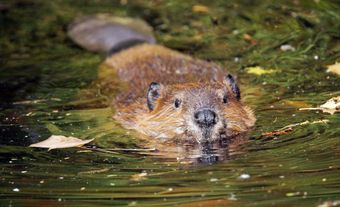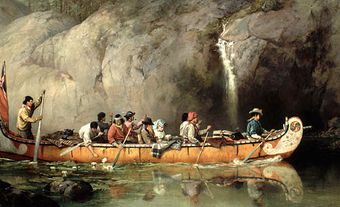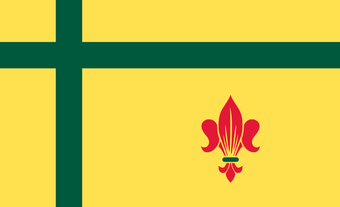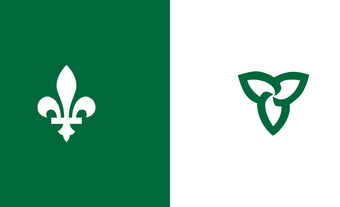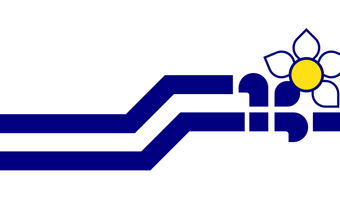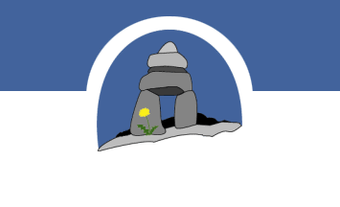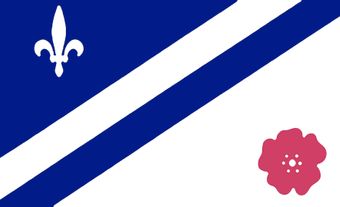New France was a French colony in North America. By the early 1740s, France controlled what is known today as the Maritime provinces, much of modern-day Ontario and Quebec, and the Hudson Bay region. The territory also stretched from today’s Northeastern United States to the Gulf of Mexico. Quebec City was the center of culture, society and economics. The French living in New France created a distinct culture. The French population of New France were known as habitants. Many habitants had a better life in New France than peasants in France. That said, not many people from France wanted to emigrate to New France. Most people in France thought New France was too cold and very dangerous. Because there was little immigration, New France had a very small population. In 1763, approximately 70,000 French colonists lived in New France. (See Population Settlement of New France.) This small population made New France weak. It was one of the most important reasons why New France was taken over by Britain in 1763.
(This article is a plain-language summary of New France. If you are interested in reading about this topic in more depth, please see our full-length entry, New France.)
French Exploration
The first French explorer who sailed to Canada was Jacques Cartier. From 1534 to 1542, he made three voyages to Canada. He was the first European to navigate the St. Lawrence River. He thought he found gold and diamonds in Canada. But he did not and France lost interest in Canada. Also, during the late 16th century France was in the middle of religious wars. So, it could not concentrate on further exploration.
Samuel de Champlain and the founding of New France
In the first decade of the 17th century, France became interested in Canada again. It sent a group of explorers to Canada in 1604. They went to the Maritimes at first. Samuel de Champlain was among this group. He became one of the most important people in the history of New France. He founded Quebec City in 1608. Unlike Jacques Cartier, he wanted to create a French colony. He is considered by many historians to be the founder of New France.
New France: Society and Economy
During the first few decades of the 17th century, the economy and the population of New France remained small. The leaders of New France were not interested in growing the economy. They were mostly interested in fur trading. Their partners in the fur trade were Indigenous peoples. Without them the fur trade could not exist. Indigenous peoples traded furs for French products. Later, the government in France wanted New France to diversify and grow. So, in 1663, King Louis XIV took control of New France. In time, the population of New France grew. The economy, however, did not grow much. It never diversified.
Relations with the Indigenous Peoples
The early French settlers depended on the Indigenous peoples to survive. The French economy also depended on the Indigenous peoples. Until the early 1700s, the fur trade was by far the most important part of the French economy. Sometimes the French fought wars with the Indigenous peoples. Their main enemy were the Haudenosaunee. The Wendat were allies to the French. Many of them became Catholics. French missionaries were very interested in converting Indigenous people. Tragically, a large percentage of the Wendat died of diseases they contracted from the French.
The Fall of New France
New France fought numerous wars with the British. They both vied for power over North America. The final war they fought was the Seven Years’ War. (See Seven Years’ War (Plain-Language Summary).) The French ultimately lost. The British military and their Indigenous allies were too strong for the French and their Indigenous allies. The legacy of New France lives on. Most French speakers in Quebec and many in the rest of Canada are descended from the habitants. (See Francophone.)

 Share on Facebook
Share on Facebook Share on X
Share on X Share by Email
Share by Email Share on Google Classroom
Share on Google Classroom


